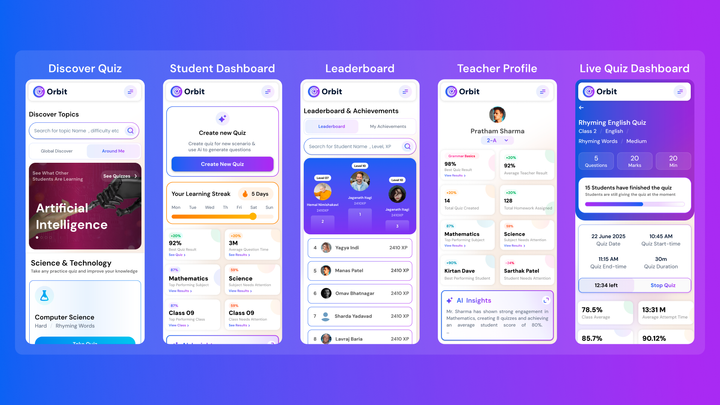How Digital Tools Improve Learning for Children with Special Needs
EdTech tools like Orbit AI are transforming how schools support children with special needs—offering personalized learning plans, real-time analytics, and inclusive communication that fosters both academic and emotional growth.
Introduction: Beyond Accommodation—Toward Inclusion
For years, schools have approached children with special needs as outliers in a system designed for the average learner. But a new wave of digital tools is helping turn that paradigm around. Today’s EdTech is not just enabling schools to accommodate neurodivergent students—it’s helping them build systems that include and empower them by design. Inforida’s AI-powered platforms, especially Orbit, Nucleus, and Project Bird, are leading this transformation.
Personalized Learning, at Scale
At the center of this change is Orbit AI, Inforida’s personalized learning engine. Orbit dynamically adapts quizzes, lesson plans, and feedback based on each student’s needs—ideal for learners with ADHD, autism, dyslexia, or other learning differences.
Orbit’s quiz creation panel, for instance, lets teachers configure everything from subject and topic to difficulty level, class group, and even quiz language. For special needs learners, this flexibility is essential. A student with processing delays might benefit from shorter quizzes in simpler language, while another may need specific vocabulary reinforcement in their mother tongue. With Orbit, these adjustments are not extra work—they’re built in.
By automating this personalization, Orbit frees teachers to focus on connection, not content formatting.
Smart Feedback for Smarter Support
Inclusive learning doesn’t end with quiz delivery—it’s equally about what happens next. Orbit provides real-time performance analytics that let teachers spot trends across individuals and groups. Visual dashboards show marks distribution, attendance by class, attempt rates, and pass/fail ratios—data that’s especially critical for identifying struggling students early.
For example, if a student with dyslexia consistently scores lower on language-based tasks, Orbit’s analytics make that pattern visible—enabling targeted support or pacing adjustments. Teachers no longer have to rely on hunches or late-stage evaluations. Instead, they get data that supports immediate, informed intervention.
A Stronger Home-School Link
Parental involvement is vital in special education, yet many schools struggle to keep families informed. Orbit addresses this with automated parent progress reports—clear, frequent updates that demystify the learning journey for caregivers.
Combined with Project Bird, Inforida’s communication engine, parents receive messages via WhatsApp, SMS, or app notifications in their preferred language. This lowers communication barriers, especially for families in multilingual households or rural areas, and ensures that critical updates never get lost in translation.
When parents and teachers operate in sync, students benefit from consistency and emotional security—something especially important for neurodivergent children.
Institutional Systems That Understand IEPs
Support for special needs students must extend beyond the classroom—it needs to be embedded into the institution itself. Inforida’s Nucleus platform provides that backbone. It manages everything from class schedules to fee payments, but critically, it also allows for role-based access, flexible curriculum structures, and performance data integration—all essential for managing IEPs (Individualized Education Plans).
And with Goood Morning, Inforida’s biometric attendance tool with emotion detection, teachers get subtle cues about student wellbeing at the start of each day. For children who may struggle to articulate their emotional state, this provides a valuable early-warning system.
Conclusion: Designed for Difference
True inclusion doesn’t mean bending the system to make space—it means building a better system altogether. Inforida’s tools like Orbit AI, Nucleus, and Project Bird represent a future where personalized, inclusive education isn’t just possible—it’s automatic.
Children with special needs deserve environments that adapt to them—not the other way around. With the right digital tools, every learner can be seen, supported, and set up to thrive.
Want to see how your school can better support neurodivergent learners? Explore Orbit AI and Inforida’s inclusive learning platform today.




